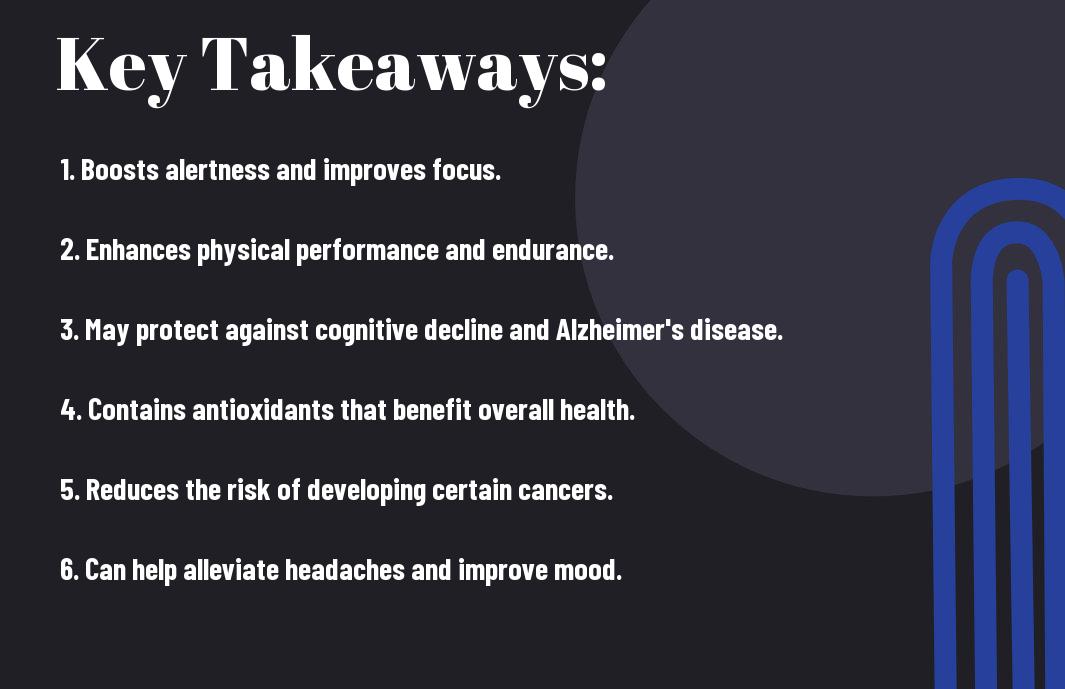Most of us rely on that morning cup of coffee to kickstart our day, but have you ever wondered why caffeine is actually good for you? In this informative post, we’ll explore the surprising health benefits of caffeine that go beyond just keeping you awake and alert. From improved focus and athletic performance to protection against certain diseases, caffeine may just be the boost your body needs.
Key Takeaways:
- Boosts alertness: Caffeine can help improve focus, concentration, and mental alertness.
- Enhances physical performance: Caffeine can increase adrenaline levels, leading to improved physical performance and endurance.
- May lower the risk of certain diseases: Some studies suggest that caffeine consumption may be linked to a lower risk of conditions like Parkinson’s disease and Alzheimer’s.
- Rich in antioxidants: Caffeine has antioxidant properties that can help protect cells from damage caused by free radicals.
- Mood booster: Caffeine can increase the production of neurotransmitters like dopamine and serotonin, which can improve mood and feelings of well-being.
The Cognitive Benefits
Improved Alertness and Focus
While many people rely on that morning cup of coffee to kickstart their day, the reason behind its effectiveness lies in caffeine’s ability to improve alertness and focus. Any caffeine consumer can attest to the almost instantaneous boost in mental clarity and attentiveness that comes with a dose of this stimulant.
Studies have shown that caffeine works by blocking adenosine, a neurotransmitter responsible for promoting sleep and relaxation, thereby increasing the firing of neurons and the release of other neurotransmitters like dopamine and norepinephrine. This leads to improved mood, reaction time, and overall cognitive function.
Enhanced Memory and Learning
An interesting aspect of caffeine’s cognitive benefits is its impact on memory and learning. An individual consuming caffeine will often experience a heightened ability to retain information and acquire new skills. This is due to caffeine’s role in enhancing memory consolidation and cognitive function.
Understanding the mechanisms behind caffeine’s influence on memory and learning involves looking at its effects on the brain’s hippocampus, the region responsible for these functions. Research suggests that caffeine can improve long-term memory and boost the brain’s capacity to process new information, making it a valuable tool for those looking to enhance their cognitive abilities.

The Physical Advantages
Some 9 Reasons Why (the Right Amount of) Coffee Is Good for You include physical benefits that can enhance your overall well-being. Caffeine has been known to provide several advantages when it comes to physical health.
Boosting Metabolism and Weight Loss
For individuals looking to maintain a healthy weight, caffeine can be a useful tool. Caffeine has been shown to boost metabolism, helping the body burn calories more efficiently. This can aid in weight loss efforts when combined with a balanced diet and regular exercise.
Increasing Endurance and Athletic Performance
To enhance your athletic performance, incorporating caffeine into your routine can make a noticeable difference. Studies have indicated that caffeine can help increase endurance during physical activities. It can reduce perceived exertion, allowing you to push yourself further and achieve better results.
Advantages of caffeine for athletic performance also include improved focus and alertness, which can be beneficial during competitions or intense training sessions. Additionally, caffeine has been shown to help mobilize fatty acids from the fat tissues, making them available for energy production, further supporting endurance activities.

The Neuroprotective Effects
After exploring the various benefits of caffeine, it’s important to probe into its neuroprotective effects. Caffeine has been found to have a positive impact on brain health, particularly in reducing the risk of neurodegenerative diseases.
Reducing the Risk of Parkinson’s and Alzheimer’s
Reducing the risk of Parkinson’s and Alzheimer’s is a crucial aspect of caffeine’s neuroprotective effects. Studies have shown that caffeine consumption may lower the risk of developing these debilitating conditions. Caffeine has been found to reduce the build-up of amyloid plaques in the brain, which are associated with Alzheimer’s disease. Additionally, caffeine has been shown to protect dopamine-producing neurons in the brain, potentially lowering the risk of Parkinson’s disease.
Protecting Against Depression and Anxiety
One of the lesser-known neuroprotective benefits of caffeine is its ability to protect against depression and anxiety. Research has demonstrated that caffeine can act as a mood enhancer by blocking the neurotransmitter adenosine, leading to increased dopamine production. This can result in improved mood and decreased symptoms of depression and anxiety.
It is important to note that while caffeine can offer some protective effects against neurodegenerative diseases, depression, and anxiety, moderation is key. Excessive caffeine consumption can lead to negative side effects and should be avoided. As with any substance, it is best to consult with a healthcare professional to determine the appropriate amount of caffeine for your individual needs.
Cardiovascular Health
Lowering Blood Pressure and Heart Rate
Not only does caffeine give you that morning boost, but it can also have positive effects on your cardiovascular system. To start with, caffeine has been shown to help lower blood pressure and heart rate. This can be particularly beneficial for those at risk of heart conditions or stroke.
Reducing the Risk of Stroke and Heart Disease
Heart health is paramount, and caffeine can play a role in maintaining it. Studies suggest that consuming caffeine regularly can reduce the risk of stroke and heart disease. This is because caffeine helps improve blood flow and may prevent the formation of clots that can lead to these serious conditions.
Lowering the risk of stroke and heart disease is crucial for overall well-being. By incorporating caffeine into your daily routine, whether through coffee, tea, or other sources, you could be taking a proactive step towards a healthier heart.
Social and Emotional Benefits
Improving Mood and Reducing Fatigue
For Caffeine enthusiasts, a cup of coffee or a sip of tea can do wonders for their mood and energy levels. An crucial benefit of caffeine is its ability to boost mood and reduce feelings of fatigue. Caffeine acts as a stimulant on the central nervous system by blocking the neurotransmitter adenosine, which helps in improving alertness and concentration. This can result in a more positive outlook and increased motivation throughout the day.
Enhancing Social Interactions and Productivity
With the help of caffeine, social interactions can become more engaging and productive. Whether it’s catching up with friends over coffee or collaborating with colleagues during a meeting, the stimulating effects of caffeine can enhance communication and productivity. With increased alertness and focus, individuals may find it easier to articulate their thoughts, actively participate in discussions, and contribute meaningfully to group dynamics.
Benefits of caffeine extend beyond personal interactions to professional settings as well. Research has shown that moderate caffeine consumption can improve cognitive functions such as memory, attention, and problem-solving skills, which are crucial for effective teamwork and project management.
Debunking Common Myths
Caffeine Addiction and Withdrawal
Myths about caffeine addiction and withdrawal often circulate, painting caffeine in a negative light. However, research indicates that while caffeine can lead to physical dependence, it is not a harmful addiction. According to the American Heart Association, moderate caffeine consumption is generally safe for most people and does not lead to severe withdrawal symptoms.
Caffeine’s Impact on Sleep Quality
The idea that caffeine negatively impacts sleep quality is a common misconception. While consuming caffeine close to bedtime can disrupt sleep patterns for some individuals, moderate consumption earlier in the day does not necessarily equate to poor sleep. In fact, research suggests that caffeine can even enhance alertness and cognitive function, particularly in the morning.
Plus, individual tolerance levels play a significant role in how caffeine affects sleep. Some people may be more sensitive to caffeine than others and should adjust their intake accordingly to avoid any disturbances in their sleep patterns.

Summing up
Following this informative exploration of the benefits of caffeine, it becomes evident that when consumed in moderation, caffeine can provide various advantages to our health and well-being. From increasing alertness and focus to potentially reducing the risk of certain diseases, caffeine can be a valuable addition to our daily routines.
FAQ
Q: What is caffeine?
A: Caffeine is a natural stimulant found in coffee, tea, and various other beverages and foods.
Q: How does caffeine affect the body?
A: Caffeine works by blocking the effects of adenosine, a brain chemical involved in sleep. This leads to increased alertness and energy.
Q: Is caffeine good for your health?
A: In moderation, caffeine can have several health benefits, such as improved concentration, enhanced physical performance, and a reduced risk of certain diseases.
Q: How much caffeine is safe to consume in a day?
A: For most adults, moderate caffeine consumption – about 200 to 400 milligrams per day, or roughly one to two cups of coffee – is considered safe.
Q: Can caffeine have negative effects on health?
A: Excessive caffeine intake can lead to negative side effects like anxiety, insomnia, digestive issues, and increased heart rate. It’s crucial to monitor your caffeine intake and listen to your body’s signals.
Unlocking the Mystique – Exploring the Rich Flavor Profile of Black Coffee
Health Benefits Unveiled – How Black Coffee Boosts Your Well-being
Caffeine Chronicles – Understanding the Power and Appeal of Black Coffee








